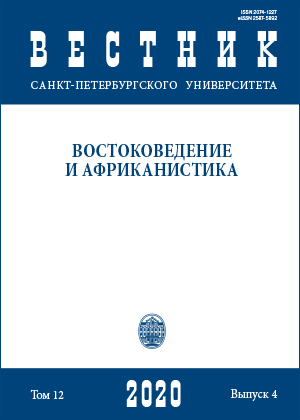Swahili Terminology in the Context of the Development of the Versification Theory and “Dispute about Poetry”
DOI:
https://doi.org/10.21638/spbu13.2020.403Abstract
The article discusses the problem of the development of a scientific approach and Swahili terminology by national Swahili literary science in the context of the emergence of new Swahili poetry in the 1970s against the background of prevailing traditional genres, as well as the comprehension, interpretation and application of this terminology by scientists. Born at the end of the 19th century among European missionaries and scholars, the theory of Swahili versification continued to develop in European-language works until the 1950s when the first critical essay on Swahili versification by the traditional poet Amri Abedi appeared. The emergence of new Swahili poetry in the mid-1970s against the background of traditional genres not only produced the well-known mgogoro wa ushairi (dispute about poetry), but also required the comprehension of poetry itself and Swahili literature as a whole. An important role in this process was the priority of developing a unified scientific approach, as well as Swahili terminology. The emergence of a new Swahili-language poetry embodied in the works of Kezilahabi, Mulokozi, Kahigi and others, from the very beginning posed the task of naming this kind of poetry. The article focuses on the unsettled nature of certain Swahili poetry terms denoting new, modernist, Swahili poetry, a reflection of which is shown by the evident heterogeneity of their use in the studies of literary Swahili scholars of the 2000–2010s.
Keywords:
prosody, Swahili, modern poetry, terminology
Downloads
References
Downloads
Published
How to Cite
Issue
Section
License
Articles of "Vestnik of Saint Petersburg University. Asian and African Studies" are open access distributed under the terms of the License Agreement with Saint Petersburg State University, which permits to the authors unrestricted distribution and self-archiving free of charge.





